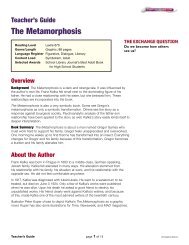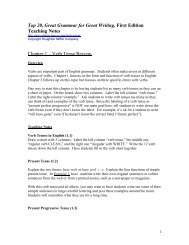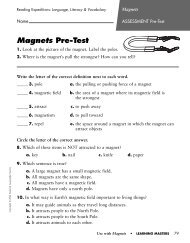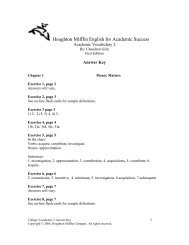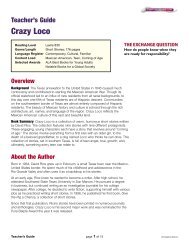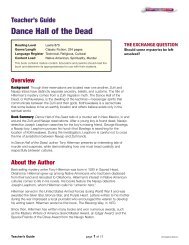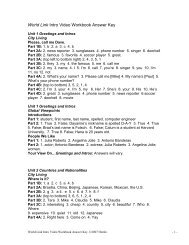English for Cabin Crew Trainer's Guide - Heinle
English for Cabin Crew Trainer's Guide - Heinle
English for Cabin Crew Trainer's Guide - Heinle
You also want an ePaper? Increase the reach of your titles
YUMPU automatically turns print PDFs into web optimized ePapers that Google loves.
UNIT<br />
9 Preparing <strong>for</strong> landing<br />
LEAD IN Speaking<br />
Ask students, How often do you experience delayed landings on<br />
fl ights that you work on? How do passengers react? What do you<br />
do in this situation? What problems does it cause <strong>for</strong> you?<br />
Giving in<strong>for</strong>mation about delayed landings<br />
EXERCISE 1 Speaking<br />
Ask students in pairs or small groups to read the situation and discuss<br />
the questions. Then get feedback in open class and build up a list of<br />
reasons <strong>for</strong> delayed landings on the board.<br />
Pre-teaching vocabulary<br />
Check the following key words: climbing (going up); in transit<br />
(connecting from one fl ight to another); fi ngers crossed (hoping to be<br />
lucky).<br />
EXERCISE 2 Listening<br />
Give students time to read the situation and questions. Ask, What do<br />
you think the passenger might have noticed? Play the recording. Students<br />
listen and then discuss their answers in pairs. Get feedback in open class<br />
at the end.<br />
Answers<br />
1 the plane is climbing, not descending<br />
2 missing a connection to Nice<br />
3 The airport might be busy.<br />
4 getting the passenger off the plane fi rst<br />
EXERCISE 3 Listening<br />
Give students time to read the situation and the questions. Play the<br />
recording. Students listen, note answers and then check in pairs. Get<br />
feedback in open class at the end and discuss the follow-up question.<br />
Answers<br />
1 about 30 minutes<br />
2 a problem on the ground<br />
3 nine o’clock<br />
4 10.15<br />
5 clear immigration<br />
6 wait <strong>for</strong> luggage or check in <strong>for</strong> his fl ight to Nice<br />
TALKING ABOUT TIME Language focus<br />
Give students time to read through the phrases in the box. Alternatively,<br />
read out the phrases and ask students to read and follow.<br />
Language notes<br />
Note the use of take to talk about a duration of time:<br />
It takes fi ve minutes to get there.<br />
You could get students practising these questions in a simple<br />
personalized activity by asking students to ask each other When, What<br />
time and How long questions, and to answer by imagining they are at the<br />
start of the last fl ight they went on.<br />
EXERCISE 4 Reading<br />
Give students time to read the questions, then ask them to read the<br />
announcements and fi nd answers. Let students check their answers in<br />
pairs be<strong>for</strong>e getting feedback in open class.<br />
Answers<br />
A runway is closed. They divert to Bordeaux.<br />
Vocabulary in context<br />
Write the following defi nitions on the board and ask students to match<br />
them to synonyms in the text: working properly (in operation); talk to<br />
you again (get back to you); minor problems (inconvenience); willingness<br />
to help (cooperation).<br />
EXERCISE 5 Speaking<br />
Ask students to work in pairs. Tell each pair to decide who is A and B,<br />
and to prepare what they are going to say be<strong>for</strong>e acting out the role<br />
play. Remind students to use language in the Language focus box.<br />
Monitor, prompt students to use rising intonation correctly, and feedback<br />
on good examples of language use and errors you heard. You could ask a<br />
couple of pairs to act out a dialogue in open class.<br />
ROUND UP<br />
Provide further practice in asking about times by getting<br />
students to interview each other about a working day. First, ask<br />
students to work in pairs to prepare When, What time and How<br />
long questions. Then mix pairs and get students to interview<br />
each other. You could get students started by suggesting some<br />
questions. For example: What time do you start work? How long<br />
does it take to get from your house to the airport? How long does<br />
it take to check in? etc. Monitor and correct the use of question<br />
<strong>for</strong>ms.<br />
39



